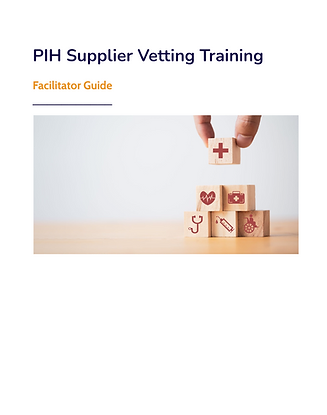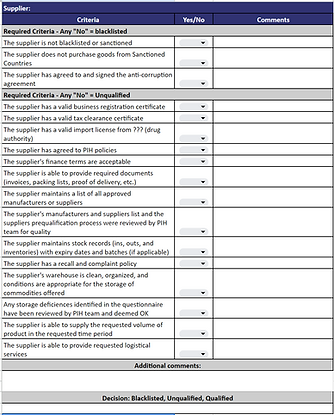

Instructor-Led Training
Background
Partners in Health is a global health organization whose mission is to provide high-quality health care to those who need it most. Since 2014, PIH has partnered with the Ministry of Health to improve health care in Sierra Leone, which has the highest maternal mortality rate in the world. In 2021, the organization established a Maternal Center of Excellence where mothers can access quality prenatal care.
In order to set up and run this new center, a large number of procurements must be made. The ability to find, vet, and work with suppliers are essential skills for Partners in Health staff. Since the team in Sierra Leone is relatively new, PIH set out to develop a curriculum around sourcing and procurement. Along with my fellow instructional designers at Boise State University, I had the opportunity to help PIH develop a training on the topic of Supplier Vetting.
In Sierra Leone, a woman’s lifetime risk of dying in pregnancy or childbirth is 1 in 17.
_edited.jpg)

Analysis
Through a combination of research and interviews with subject-matter experts, my team and I conducted a systematic analysis to better understand the learners, the tasks, and determine the configuration of the training.
.png)
Learner and Environmental Analysis
Through conversations with our SMEs, we determined the following about the learners:
-
The procurement specialists are hired locally, rather than internationally.
-
They have a few years' experience already with supplier vetting, but are mostly new to the organization.
-
They are committed to their work and motivation is strong. The Sierra Leone initiative is a flagship project and stakes are high.
-
They appreciate opportunities for discussion and the chance to interact with each another.

Task Analysis
Vetting suppliers is an especially critical task within the procurement process. It is not enough to simply find the right item at the right price: procurement specialists must also ensure that the process of evaluating suppliers is efficient, clearly documented (i.e. transparent), and meets the ethical standards of the organization. Our task analysis listed out procedural steps, but also included conceptual elements that can be applied to more challenging situations.

Training Needs Analysis
The location for this training is an office in Freetown, Sierra Leone. While they have internet and computer use is standard for employees, the infrastructure is not always reliable. As such, we determined that an in-person, instructor-led session would be ideal. This format would also allow the instructor to demonstrate how to use the documentation (questionnaires, rubrics, etc.), and give learners the opportunity to discuss challenges and ask clarifying questions.
Instructional Materials
ID Principles
We developed our lesson plan and instructional materials using the following ID principles:
-
Backwards Design: Beginning with the task analysis, transforming the task analysis into performance requirements, and designing actual content last so it serves the goals of the intervention.
Task analysis --> Performance requirements --> Performance assessment --> Practice exercises --> Content -
Authentic Learning: Making the lesson reflect the real-world environment as much as possible, for example using the actual tools and templates that the team will be using on the job.
-
Merrill's Principles of Instruction: Creating lesson activities that are problem-centered, activating prior knowledge, and providing opportunities for application.
Slide Deck
Facilitator Guide
Job Aid

Reflections
Working on this project has been both a rewarding endeavor and a learning experience. It was an honor to contribute, albeit in a small way, to an organization that is bringing medical care to the communities that need it most. It was also a pleasure to collaborate with a talented team of instructional designers and subject-matter experts!
As in every project, there were challenges along the way, from unreliable internet connections to scheduling meetings across four different time zones (Sierra Leone was a fifth!). The biggest challenge for me was taking on a topic - supplier vetting - that was outside of my usual expertise. Normally this would not be an issue (as IDs, we love learning new things) but in this case, time with SMEs was limited and the topic is a difficult one to research online. As such, we did our best with the time, resources and manuals provided to us. Furthermore, we made sure to give PIH working files of all materials so they could update them as new information and resources became available.
Lessons Learned
-
Communication: Weekly team meetings are crucial for success. Schedule regular "in-person" check-ins to make sure the project is on track and each person's role is clear.
-
Project Management: Be very clear from the beginning about how much input (time, resources, etc.) you will need from the client and share a specific schedule that you can continually refer back to.
-
Priorities: Every project has constraints, and so as an ID you must continually assess 1) what is important, 2) where to focus your efforts, and 3) what to let go of. That last one is probably the hardest for me, but easier when I remind myself of what is truly essential and valuable (=helping PIH achieve their mission).



